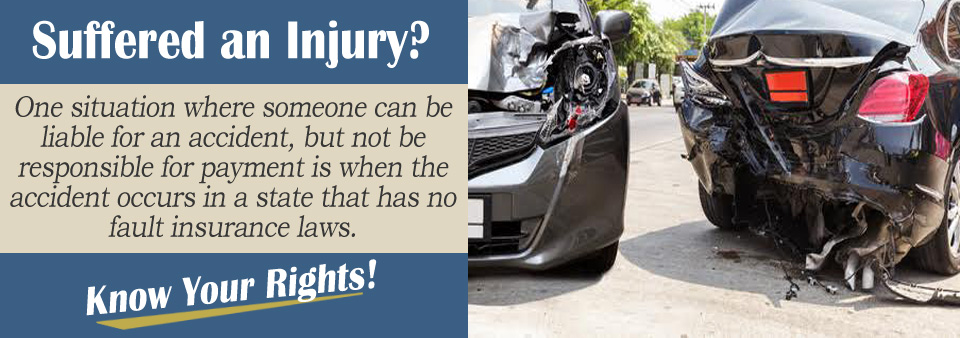Liability can be tricky when it comes to personal injury cases. You may assume that the person who actually caused the accident is automatically the person responsible for payment for the accident, and while that may be true for most situations, it is not true all of the time.
What are the circumstances when someone is liable for causing the accident but is not liable for payment for damages caused by the accident?
We have asked attorney, Alaina Sullivan, about what you should do. Here is what she had to say:
No Fault Insurance
One situation where someone can be liable for an accident but not be responsible for payment is when the accident occurs in a state that has no fault insurance laws. Currently a dozen states, including Florida, Michigan, New Jersey, New York, Pennsylvania, Hawaii, Kansas, Kentucky, Massachusetts, Minnesota, North Dakota and Utah, have no fault insurance laws.
Under no fault insurance, it does not matter which driver causes the accident. Each driver is instructed to file insurance claims under his or her own insurance policy. Therefore, even if the other driver was clearly at fault, you must file for compensation for your injuries under your own insurance policy. Fortunately, only a limited number of states follow this policy, but for those that do, options for compensation are very limited.
When Driving Another Person’s Vehicle
Does the insurance follow the person or the car? That question is not an easy one to answer. However, if an insured driver allows another person to drive his or her vehicle, the insured could be the one held responsible for payment should the permitted driver get into an accident.
It depends on the insurance policy as to whether a driver is held responsible for an accident he or she causes in another person’s car. Usually these decisions are very fact specific. Many insurance policies will not cover another driver unless he or she is specifically named in the insured driver’s policy. Some insurance companies will look to whether the other driver lives or is related to the insured.

Employer-Employee Relationship
Another situation where the driver who causes the accident may be considered liable for the accident but not for payment for damages caused is when the driver is acting within his or her scope of employment.
If the driver is driving either an employer’s vehicle or his or her own vehicle on behalf of the employer, and he or she causes an accident, insurance companies will often look to the employer for compensation for injuries sustained. The reason is the driver would not be behind the wheel if not for the employer, and the act that caused the accident was done in the course of employment.
Therefore, the employer would be the party liable. Only if the driver was doing something not within the scope of his or her own employment or was acting with extreme recklessness would insurance companies potentially look to the driver for financial responsibility.
Contact a Personal Injury Attorney Today
If you have been involved in an accident, a licensed personal injury attorney will be able to evaluate your case and determine if you have a claim against the other party’s insurance company. To receive the compensation for your medical bills, property damages, and pain and suffering, you should speak with a personal injury attorney in your area today.